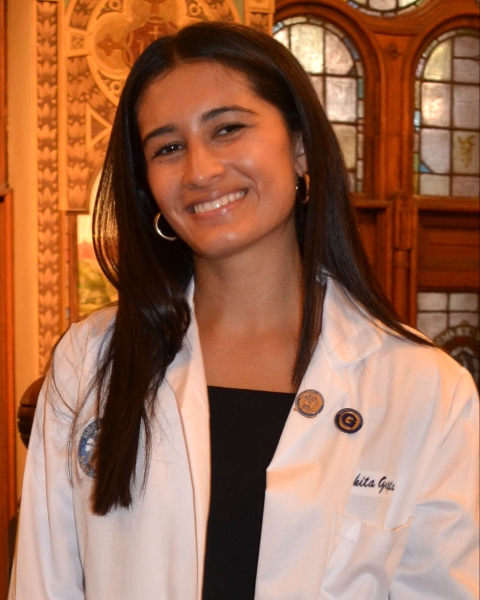PQA 06 - PQA 06 Biology and Patient Reported Outcomes/QoL/Survivorship Poster Q&A
2801 - Patient Reported Quality of Life after Chemoradiation for Esophageal Cancer: Analysis of Clinical and Dosimetric Predictors
Monday, September 30, 2024
5:00 PM - 6:00 PM ET
Location: Hall C
Screen: 6

Nikita Gupta, BS
Georgetown University School of Medicine
Potomac, Maryland
Presenter(s)
N. Gupta, V. Sharma, M. Shang, A. Sharif, and K. R. Unger; Department of Radiation Medicine, MedStar Georgetown University Hospital, Washington, DC
Purpose/Objective(s): Health-related quality of life (HRQOL) is an important outcome measure for esophageal cancer patients. After radiotherapy (RT), patients commonly experience changes in physical, social, functional, and emotional well-being. The aim of this study is to characterize the impact of clinical and dosimetric factors on HRQOL after chemoradiation for esophageal cancer. Materials/
Methods: Esophageal cancer patients treated with concurrent chemoradiation between February 2019 and November 2022 at a single institution were eligible. Patients prospectively completed Functional Assessment of Cancer Therapy-Esophagus (FACT-E) at baseline (Time 0), end of RT (Time 1), and 3 months post-RT (Time 2). Paired T-test was performed to assess trend between timepoints. Patients were split between a 70% training and 30% validation set. Candidate predictors included radiation modality (proton vs. photon), dosimetric parameters (volume of esophagus, bilateral lungs, body, heart, liver, stomach, duodenum, bowel receiving 10, 20, 30, 40, 50 Gy), tumor histology, tumor stage, gender, ECOG, age, and surgery. Univariate and multivariate analysis was performed on the candidate predictors. Models were tested on the validation set and prediction accuracy was determined. Following preliminary results, pre-RT and post-RT hepatic laboratory values (prothrombin time (PT), partial thromboplastin time/international normalized ratio (PTT/INR), alkaline phosphatase (ALP), bilirubin, and albumin) were extracted and underwent correlation analysis.
Results: Thirty-seven patients with stage I-IV esophageal cancer treated to 35 – 59.4 Gy in 14 – 33 fractions were included; compliance for all three timepoints was 27%. Mean FACT-E scores at baseline, time 1, and time 2 were 143.2, 128.6, and 143.9, respectively. Compared to baseline, FACT-E score was significantly lower at time 1 (p=0.006) but not time 2. Twenty-eight patients who completed questionnaire at Time 0 and 1 were selected for dosimetric analysis. MVA model revealed Liver V40 to be predictive of lower FACT-E score (ß=-1.8, S.E.=0.5, p=0.009). Liver V40 predicted lower functional well-being (FWB) and esophageal cancer subscore (ECS), however it was a better predictor of FWB (RMSE=6.03) than ECS and FACT-E. Correlation analysis showed Liver V30 and V40 was positively correlated with ?PT and ?INR (r=0.6, p=0.03). Liver V50 was positively correlated with ?ALP (r=0.4, p=0.04), post-RT bilirubin (r=0.659, p < 0.001), and ?bilirubin (r=0.655, p < 0.001).
Conclusion: Patient-reported HRQOL scores significantly decreased following chemoradiation for esophageal cancer but were not significantly different from baseline 3 months after treatment. Increasing liver dose and volume parameters were associated with reduced HRQOL and altered hepatic laboratory results; to our knowledge this association has not been previously reported. While further study is warranted to validate this correlation, unnecessary radiation to the liver should be avoided.
Purpose/Objective(s): Health-related quality of life (HRQOL) is an important outcome measure for esophageal cancer patients. After radiotherapy (RT), patients commonly experience changes in physical, social, functional, and emotional well-being. The aim of this study is to characterize the impact of clinical and dosimetric factors on HRQOL after chemoradiation for esophageal cancer. Materials/
Methods: Esophageal cancer patients treated with concurrent chemoradiation between February 2019 and November 2022 at a single institution were eligible. Patients prospectively completed Functional Assessment of Cancer Therapy-Esophagus (FACT-E) at baseline (Time 0), end of RT (Time 1), and 3 months post-RT (Time 2). Paired T-test was performed to assess trend between timepoints. Patients were split between a 70% training and 30% validation set. Candidate predictors included radiation modality (proton vs. photon), dosimetric parameters (volume of esophagus, bilateral lungs, body, heart, liver, stomach, duodenum, bowel receiving 10, 20, 30, 40, 50 Gy), tumor histology, tumor stage, gender, ECOG, age, and surgery. Univariate and multivariate analysis was performed on the candidate predictors. Models were tested on the validation set and prediction accuracy was determined. Following preliminary results, pre-RT and post-RT hepatic laboratory values (prothrombin time (PT), partial thromboplastin time/international normalized ratio (PTT/INR), alkaline phosphatase (ALP), bilirubin, and albumin) were extracted and underwent correlation analysis.
Results: Thirty-seven patients with stage I-IV esophageal cancer treated to 35 – 59.4 Gy in 14 – 33 fractions were included; compliance for all three timepoints was 27%. Mean FACT-E scores at baseline, time 1, and time 2 were 143.2, 128.6, and 143.9, respectively. Compared to baseline, FACT-E score was significantly lower at time 1 (p=0.006) but not time 2. Twenty-eight patients who completed questionnaire at Time 0 and 1 were selected for dosimetric analysis. MVA model revealed Liver V40 to be predictive of lower FACT-E score (ß=-1.8, S.E.=0.5, p=0.009). Liver V40 predicted lower functional well-being (FWB) and esophageal cancer subscore (ECS), however it was a better predictor of FWB (RMSE=6.03) than ECS and FACT-E. Correlation analysis showed Liver V30 and V40 was positively correlated with ?PT and ?INR (r=0.6, p=0.03). Liver V50 was positively correlated with ?ALP (r=0.4, p=0.04), post-RT bilirubin (r=0.659, p < 0.001), and ?bilirubin (r=0.655, p < 0.001).
Conclusion: Patient-reported HRQOL scores significantly decreased following chemoradiation for esophageal cancer but were not significantly different from baseline 3 months after treatment. Increasing liver dose and volume parameters were associated with reduced HRQOL and altered hepatic laboratory results; to our knowledge this association has not been previously reported. While further study is warranted to validate this correlation, unnecessary radiation to the liver should be avoided.
